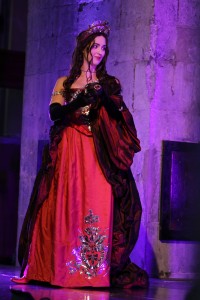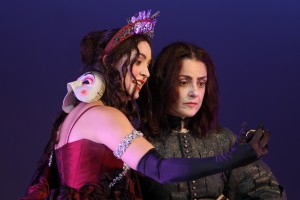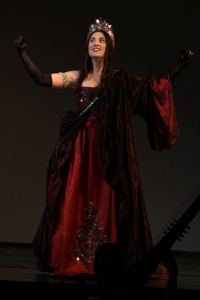Venus in Galway

Natalie Davies, who finished her BA Honours Music degree last summer, had operatic dreams come true over the summer: In May 2014, I was lucky enough to be accompanied by Erin Headley and Elizabeth Kenny on the lirone and theorbo respectively, whilst singing early music duets in a concert with my duet partner, Leila Zanette, at the University of Southampton. Erin mentioned that she was going to be musically directing an opera in the summer that was being staged as part of the Galway International Festival in Ireland, and that she would try to find a way to include both of us in the production. To our disappointment, we were soon informed that it was not going to be possible to fund our involvement in the opera. A month later, however, Erin contacted me to say that a soprano had dropped out and would I be interested in replacing her?! Saying ‘yes’ (which I did with gusto!) was the best decision of my life to date.
Including a Baroque opera in the diary was a first for the Galway Music Festival, and Erin had chosen a rarely-performed opera, Luigi Rossi’s Orfeo (1647), in an attempt to offer the audience something unique and unfamiliar. As it was unknown how such a production would be received, the budget provided was much lower than usual, causing the rehearsal schedule and size of the cast to be as condensed as possible. As a result, we were only given from the 10th-22nd of July to rehearse an opera that lasted over two hours, with just one full dress rehearsal on the night of the 22nd before the actual performances on the 23rd and 24th of July, which were to be staged in St. Nicholas’ Church, Galway. Needless to say, the days were very long, with rehearsals going on from 10am until 10pm (or later!). Despite the long days, working with such experienced and beautiful singers as principals Lucia Cirillo, Nadine Balbeisi, Theodora Baka and Steve Dugardin was an absolute dream and I learnt so much just from watching them work. The stage director, Alessio Rosati, also worked wonders with such a tight budget, producing the most beautiful costumes and creating scenes that  were strikingly moving despite the lack of actual scenery.
were strikingly moving despite the lack of actual scenery.
I played the role of Venus, a villainous Goddess who (in a twist from the original Orpheus myth) plots to break up the union between Orpheus and Eurydice by killing Eurydice. Due to money constraints, however, the less principal singers had to play several roles, and I also ended up playing a Parche (one of the three blind fates who control the ‘threads’ of life), one of the three Graces (I sang in the trios with two other female cast members) and a guest at a wedding and at a funeral! This involved numerous (rapid!) costume changes and lots of learning of music! When the first night of the performance came round, we were all fairly apprehensive as to how it would go but, fortunately, our hard work paid off. The director of the music festival, Paul Fahy, was “completely blown away by the entire performance…and by its faithfulness to the context of the original production in Paris all those years ago,” and expressed his wishes that this opera would be the first of many in the Galway festival, a fantastic result for all involved.
 Collaborating with such creative, fun and hard-working artists and musicians showed me how satisfying and emotional an experience being involved in an opera can be and how much you can explore and learn about yourself by adopting different characters and using the music to inform your interpretation of the role and drama. I was also aware throughout my time in Ireland of how well my music degree and Elizabeth Kenny’s early music coaching in particular had prepared me for my involvement in this work, and I was very grateful for it! Being involved in this production totally changed my perception of the involvement of singers in opera; by the end of the two-week period I was subconsciously thinking of everybody as ‘actors’ rather than singers. As a performer, I have always struggled (and will continue to struggle) to become somebody else when performing. When playing a character in an opera however, you have to absorb yourself so totally in the role that, after a while and almost imperceptibly, your performance really does become about the music and the person you are trying to personify, rather than yourself. This was a truly LIBERATING experience and for the first time, albeit fleetingly, I was able to appreciate the true joy of performance. This experience has truly made me yearn for a professional career in performance and I will do my utmost to make it happen, but whether luck (and talent) will be on my side or not will remain to be seen. Of one thing I am certain, studying music at the University of Southampton, and being in contact with such fantastic early baroque professionals as Elizabeth Kenny and Erin Headley, has opened doors (and dreams) for me.
Collaborating with such creative, fun and hard-working artists and musicians showed me how satisfying and emotional an experience being involved in an opera can be and how much you can explore and learn about yourself by adopting different characters and using the music to inform your interpretation of the role and drama. I was also aware throughout my time in Ireland of how well my music degree and Elizabeth Kenny’s early music coaching in particular had prepared me for my involvement in this work, and I was very grateful for it! Being involved in this production totally changed my perception of the involvement of singers in opera; by the end of the two-week period I was subconsciously thinking of everybody as ‘actors’ rather than singers. As a performer, I have always struggled (and will continue to struggle) to become somebody else when performing. When playing a character in an opera however, you have to absorb yourself so totally in the role that, after a while and almost imperceptibly, your performance really does become about the music and the person you are trying to personify, rather than yourself. This was a truly LIBERATING experience and for the first time, albeit fleetingly, I was able to appreciate the true joy of performance. This experience has truly made me yearn for a professional career in performance and I will do my utmost to make it happen, but whether luck (and talent) will be on my side or not will remain to be seen. Of one thing I am certain, studying music at the University of Southampton, and being in contact with such fantastic early baroque professionals as Elizabeth Kenny and Erin Headley, has opened doors (and dreams) for me.

